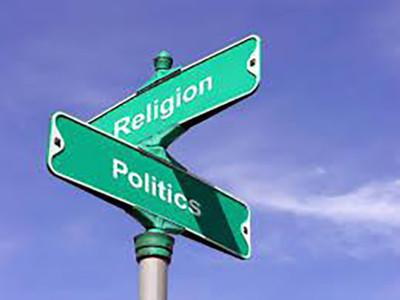
As Orthodox Jews, we pride ourselves in having Torah inform and guide all areas of our life. Our political views, too, are shaped by the values that we have absorbed through our religious teachings. It is not surprising, therefore, that writers in the frum Jewish media, from editors to publishers, frequently intersperse and support their political opinions with verses and passages from the Torah. While understandable, this practice is misguided and can lead to very counterproductive outcomes.
Torah is divine and the embodiment of truth, but our political opinions are mere opinions, often biased ones and products of our social media echo chambers. Torah should not be used to support something as partisan and subjective as our political opinions. Whether we like to admit it or not, our political opinions can be wrong. In our growing polarized climate, resorting to Torah sources is all the more troubling. The Torah could, theoretically, offer a plethora of sources and insight on political events and issues, but we stand to lose much more than to gain.
Politics has become an increasingly partisan affair and there are few things in life that evoke such passionate disagreement and division. People used to have tolerance for political viewpoints that were fundamentally different than their own; instead, not only have people become increasingly intolerant of different political views, in recent years there has festered a mutual dislike, even animosity, between people with opposing political perspectives, in a phenomenon social psychologist Jonathan Haidt calls affective polarization. People no longer just hate the message, they hate the messenger, too.
Orthodox Jews cringe when they read political columns by Jews who use Torah passages to support their left-wing positions. They feel bad for their distorted interpretations of Torah. But consider a hypothetical scenario in which a liberal secular Jews reads an opinion column by an Orthodox rabbi who argues that President Trump’s immigration policy is right and bolsters his argument with sources from the Torah. It’s very reasonable to assume that this secular Jew’s relationship with the Torah-true Judaism has further been distanced. Not only does he perceive the columnist’s views- and possibly the columnist- as morally reprehensible, his perception of Torah has now become tainted; this is not the Torah that he wants to associate with. Torah was unnecessarily thrown into this salad of raw emotions and convictions.
Even Jews who were raised in the religious Orthodox fold but who align themselves with more politically liberal or centrist views will potentially get turned off from Torah Judaism when reading political opinions that they disagree with being bolstered by Torah verses. Political writers could easily support their argument without having to resort to Torah verses and passages, which, unknown to some readers, are themselves subject to a myriad of legitimate Orthodox interpretations.
There are certainly writers in Orthodox Jewish media who do use history, political theory, psychology, and other fields of knowledge to buttress their political arguments. That is the correct approach. If Orthodox Jews want to make convincing arguments in support of their political positions and push for legislation that promotes their agenda, they need to be armed with evidence that carries weight in political discourse and government. A publisher’s political commentary peppered with verses from the Torah achieves very little, if anything.
We are very fortunate to have an Orthodox Jewish media that is filled with a lot of helpful information on an array of diverse topics, such as parenting, education, marriage, dating, and self-help. Torah sources are and should be used for all those topics. But political opinion should be the exception. Let’s leave Torah out of it.
By Tzvi Haimov
Should We Use Torah Sources for Political Commentary and Opinion?
Typography
- Smaller Small Medium Big Bigger
- Default Helvetica Segoe Georgia Times
- Reading Mode




